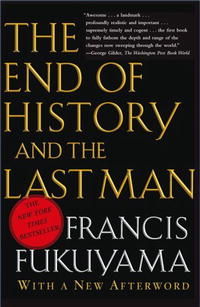History is directional, and its endpoint is capitalist liberal democracy, asserts Fukuyama, former U.S. State Department planner. In a broad, ambitious work of political philosophy, he identifies two prime forces that supposedly push all societies toward this evolutionary goal. The first is modern natural science (with its handmaiden, technology), which creates homogenous cultures. The second motor of history (which the author borrows from Hegel) is the desire for recognition, driving innovation and personal achievement. Fukuyama"s main worry seems to be whether, in the coming of what he considers a capitalist utopia, we will all become complacently self-absorbed "last men" or instead revert to "first men" engaged in bloody, pointless battles. Several of the countries that he christens capitalist liberal democracies--Turkey, the nations of South America--are in fact either oligarchies or police states, and his contention that liberal democracies do not behave imperialistically flies in the face of world and U.S. history. Nevertheless, this self-congratulatory book will probably be popular and widely discussed, like Fukuyama"s 1989 National Interest essay, "The End of History"? Это и многое другое вы найдете в книге The End of History and the Last Man (Francis Fukuyama)
The End of History and the Last Man Francis Fukuyama
Подробная информация о книге «The End of History and the Last Man Francis Fukuyama». Сайт не предоставляет возможности читать онлайн или скачать бесплатно книгу «The End of History and the Last Man Francis Fukuyama»
